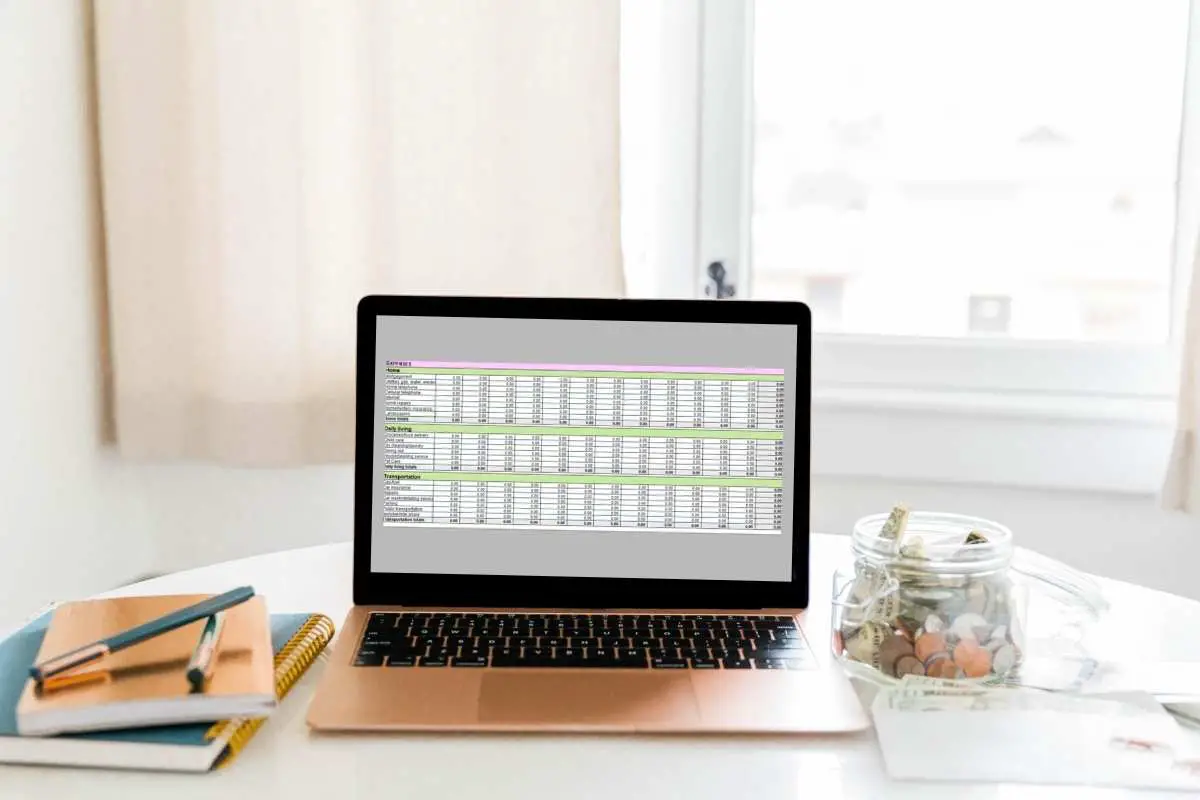In short, this method’s goal is that your income minus your expenses will equal zero by the end of the month.
Managing your money can be hard, and zero-based budgeting is a great way to make it easier.
The zero-based budgeting method requires you to use every penny of your monthly income. But that doesn’t mean you spend it all! It just means you have to give it a place to go.
Zero-based budgeting is a method that has you allocate all of your money to expenses, savings, and debt payments. The goal is that your income minus your expenditures equal zero by the end of the month.
If you’re thinking budgeting is boring, complicated, or just doesn’t for you, you might find that you like this method.

What is zero-based budgeting? All income must have a job
It’s a budget that assigns every dollar you make in a month to an expense category. No amount of money is left in the bank. Well, it can be left in the bank as savings, but it can’t be left without a job floating in the breeze. When it enters your bank account, you must give it a job.
A zero-based budget is a method that has you allocate all of your money to expenses saving and debt payments — meaning if you make $5,000 this month (after taxes), every dollar of that is spent on something.
Expense categories can include:
- living expenses (mortgage, the electric bill, water bill, etc.)
- groceries
- entertainment (eating out, date nights, family fun)
- streaming services
- a fund for upcoming car expenses
- debt repayment (student loan, car loan, credit card)
The list can go on, but every single dollar you make is placed in a category.
That is a zero-based budget, my friend.
Zero-based budgeting vs traditional budgeting
One of the biggest differences between zero-based and traditional budgeting is the money allocated for irregular expenses like vacations or car repairs.
In a zero-based budget, there should be actual, specific categories for things like “car repair” and “trip to Miami.” In most budgets, that money goes into a generic savings account for emergencies.
(Or more likely, it does NOT go into a generic savings account, gets spent on something dumb, and then when car repairs roll around, there’s no money for them!)
In zero-based budgeting, you treat every dollar as sacred, so they all have jobs, and there’s no such thing as money sitting around in a bucket. This is the huge advantage of this budgeting process: you start to understand that extra money is NOT extra. You will need it in the future, and you better designate what it’s for while you have it.
How do I make a zero-based budget?

Well, a lot of budgets start with your expenses. But zero-based budgeting has taught us that we have to work with reality, which is your income.
But in reality, “income” feels a bit nebulous, doesn’t it? Money flows in; you put some things on a credit card, money flows out.
What can we really start with? The money that is currently in your bank account. That’s it. That’s the only money you have to work with right now.
We have to decide on our expense categories, so we know what to do with this money.
First, we have our non-negotiables.
These are the expenses that you must pay, no matter what.
For example, mortgage (rent), car loan, the electric bill, water bill, etc., are living expenses. Some bills can be irregular expenses and fluctuate each month, but for the most part, you should know an average of what your electricity and water bill is.
Next, we have upcoming spending
These are things we have committed to pay for in the future. Annual tax bills, repairs that are coming up, a vacation that’s happening in three months that isn’t fully paid for.
These are the things that many budgeting systems forget about. They always roll around, so there’s no need to act surprised by them. And if you’re like most people, you’ll find that your income runs out after this step.
Last, we have discretionary spending.
You know, the fun stuff. Presents. Restaurants. Those infamous lattes.
Here’s the important part. When you list out these categories, you are just making a list of mouths to feed and in what order you will feed them. Until the money actually hits your bank account, they are all still hungry.
Zero-based budgeting example:
If you were using zero-based budgeting, here’s how it might look:
Current Bank Account Balance: $855
Non Negotiable Expenses
Mortgage: $1200
Groceries: $450
Electric Bill: $90
Preschool Tuition: $150
Upcoming Expenses:
New tires: $600
Property taxes: $1400
Bridesmaid dress: $170
Discretionary Spending
Dinner out on Saturday: $80
New books: $40
In this situation, all of your money is spoken for and then some.
But wait! You get paid on the 15th, and that will cover all these expenses. So surely you can just keep charging things on your credit card, and it will all work out fine, right? Well… has it?
The zero-based budgeting process tells you to give those dollars in your bank account a job (starting with the mortgage is always a good idea!). And when more money comes in, work on down the list, assigning categories as you go.
And what this teaches you is that you don’t really have as much as you thought—a crucial lesson.
What’s the magic of a zero-based budget?
You’re able to stay aware of your spending. You actually understand where your money is going. When there is a pinch, you feel it. You don’t just wish and hope it away and tell yourself, oh, we get paid soon.
It also hurts a little more when you go over in one area of your budget because you have to pull from somewhere else.
It’s an excellent tool for cutting out debt and learning the ropes on how to manage your money better. Since you have to keep track of how much money is going in and out throughout the month.
What should I do with my leftover income?
You have to put it somewhere. Every dollar has to find a job.
Put the excess income towards debt, investing (if you no longer have debt), or something you’re saving for (i.e., vacation).
You should have NO remaining income. Expenses equal income. Wha It should all have a place. What remains? Zero!
This is why it’s called zero-based budgeting, in case you didn’t know. But we are all A+ students here, so you knew that. 😉
Irregular monthly income? No problem.
One of the best things about zero-based budgeting is how it works for the self-employed or with irregular incomes. You are dealing with the money you actually have, not an expected number.
Like everyone else using this method, you have to know how much money you have and what you need to do with it.
You have to be extra diligent about planning for things like taxes and upcoming expenses.
As far as your non-negotiable category? Just base your budget on the lowest amount of income you could make in a month.
What if something unexpected happens?
Emergencies happen, the car breaks down, children get sick. That’s why one of the first things you should always do when starting a new budgeting method is save for an emergency fund.
The amount you need for your emergency fund can vary. It depends on your family’s needs. But don’t get hung up here.
You don’t need to save for multiple month’s worth of income if you still have debt. Many opinions vary on the percentage towards income, but I say be wise, but don’t stall.
How do I keep track of my charges?
This part can sometimes be overwhelming, but don’t let it be.
Make this system your own.
The envelope system is a way to keep track of charges. Have an envelope for each expense category and place cash in the envelope.
Or, since cash isn’t always practical, take a blank envelope and label it with one category (i.e., groceries). Instead of placing cash in there, put your receipt in the envelope, then total your charges for the week.
Now you know what you spent on eating out for the week and what you have left. Use the same envelope throughout the month for each category, and now you have an easy receipt system when tax time rolls around.
Of course, there are also apps and spreadsheets. The app You Need a Budget is top-rated and is based on this method.
What happens if I forget about a charge?
This part can cause some stress too. Let’s say you created your monthly budget but forgot that you have to buy your daughter’s dance costume towards the end of the month.
It happens.
If you have excess income, you can arrange for a small amount each month to go into a separate category named Unexpected or Forgotten.
Now you have a cushion each month. However, don’t mistake this as a free-spending category. This is just to ease your mind when things come up that aren’t quite in the realm of an emergency fund.
What if I have money leftover in a category at the end of the month?
Well, congratulations!
Throw a party and then put that money towards another expense category for that month, maybe put it towards next month’s budget, or keep the extra cash for emergencies.
What you decide to do with your leftover money depends on your current financial goals.
Is this right for me?
If you’re an overspender and not sure why you never have enough to pay the bills at the end of the month, this is the budgeting method for you.
Or, if you’re a meticulous planner that likes to keep tabs on every detail, this system is also for you.
Give it a shot! I encourage you to try it for at least three months. If it isn’t for you, there are plenty of other methods that might fit your situation better.
Budgeting isn’t one-size-fits-all.
And thank goodness for that!
Zero-based budgeting is a way of managing your finances that can be very helpful for people who don’t really have a handle on where their money is going. It helps you stay on top of what money you have and how to use it wisely because zero-based budgeting requires 100% accountability.
You need to plan to avoid overspending. We all know this, but this structured approach forces you to do it! That means considering future expenses like taxes and unforeseen events like car repairs when creating your monthly budget.
The only way to know if it’s the system for you is to dive and try. Check your bank balance and take control of your budget once and for all.
Good luck!
